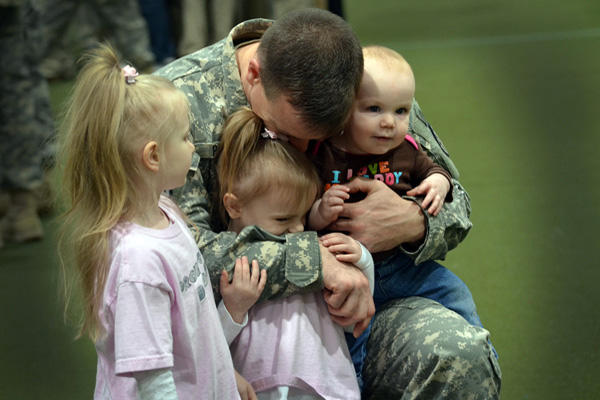Even when we are not at war, military families often deal with stresses such as frequent moves or the absence of a parent. Deployment to war creates additional issues for a family to handle.
Families face a number of challenges before, during, and after deployment. This emotional cycle of deployment begins when news of deployment is released to the family. It starts with a short period of strong emotions, such as fear and anger. As departure grows closer, a period of detachment and withdrawal may occur. This can happen to prepare for the person being physically gone.
During the deployment family members have a range of feelings and experiences, including:
- Concern, worry or panic
- Loneliness, sadness
- Added family duties and responsibilities
- Learning new skills, making new friends
- Fear for their service member's safety
- Feeling overwhelmed
- Financial difficulties
- Dealing with problems on their own
- Understanding what your loved ones have been through
- Concern over being needed and loved
Children's reactions to a parent's deployment vary with each child. Reactions depend on age, maturity and any other behavioral or mental health problems the child might have. The mental health of the at-home parent often affects the child's distress level. This is especially true for young children. If parents successfully handle the stress of deployment, their children are less likely to have mental health or behavior problems. For more information see Children Coping with Deployment.
What happens after the deployed service member returns?Experiences during deployment have helped make your family and service member more responsible. You have grown but you have also faced many challenges. Remember, readjustment following deployment takes time. Even if your service member has been called up before, you may find that new challenges arise with each reunion. Reunions can be happy and stressful. There is usually a "honeymoon" phase shortly after demobilization, but it will probably be temporary. Children have grown. Your service member has been through traumatic experiences. You have had to face new situations in your service member's absence. You might also feel angry because you had to handle so much on your own while they were away.
Family members at home have changed, too. You may have developed new relationships. You may be feeling pride in what you were able to accomplish while your service member was away. For some couples, issues of infidelity may have arisen. Partners may need to talk about each other's commitment to the relationship.
Family members are affected by the common stress reactions that occur after a service member spends time in a war zone. Know what types of reactions to expect. These symptoms often have more to do with deployment to war than with the family, and remember that it takes time to readjust. Certain symptoms seem to have the greatest impact on relationships. The most troublesome for newer Veterans following time in Afghanistan and Iraq seem to be sleep problems, dissociative symptoms (problems with knowing who or where you are), and sexual problems. If symptoms continue, PTSD can develop and cause other problems.
Parents and other family members of service members must make many of the same readjustments as partners. They, too, will have to realize that everybody has grown and changed. Their relationship with the returning service member will also be different. While they take time to get reacquainted, they will need to be aware of boundaries. It's easy for parents and others who have cared for a service member in the past to fall into old patterns. They want to take care of their loved one again in ways the person no longer needs or wants.
Impact of PTSD and other mental health problems on familiesMany service members returning from deployment to the recent conflicts are reporting family adjustment issues. Some Veterans report shouting with, shoving, or pushing current (or former) partners. Some Veterans say that their partner or children are afraid of them.
When the common reactions to war don't get better over time, or get worse, it may indicate more serious problems. If reactions are impacting life at home, work or school it is time to seek assistance. For more information, see Effects of PTSD on Families.
SummaryThe effects of war can extend far beyond the deployed service member. Children and families can struggle with changes resulting from an absent parent or spouse. Families can also face problems when the absent service member returns.
The mental health of the at-home parent plays a key role in how children cope with deployment. The mental health of the returning service member also affects the children and indeed the whole family. The needs of the entire family are important. Resources are available both within and outside VA to help families.
SourcesThis fact sheet is based on a more detailed version, located in the "Professional" section of our website: How Deployment Stress Affects Children and Families: Research Findings.


















